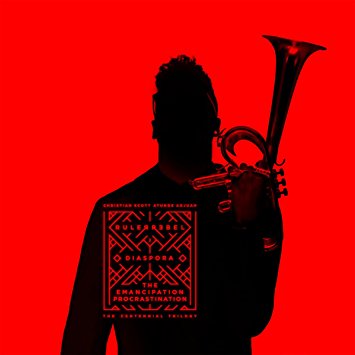
A few weeks ago, I posted my annual Music and Myth Awards, naming the Music and Myth’s selection for Best Vocal and Instrumental Records for 2017. While the Best Vocal Record went to Sofia Rei’s El Gavilan (featuring Marc Ribot) – a project I’ve been raving about for the entire year – my selection for Best Instrumental was, for the first time, an album I hadn’t yet reviewed.
With The Music and Myth on hiatus for most of 2017, during which time Christian Scott aTunde Adjuah released the three albums that comprise his Centennial Trilogy, I haven’t had the opportunity to write about any of the records individually. In hindsight, that may have been for the best, as Scott’s ambitious project is best understood if studied in its entirety.
With The Centennial Trilogy, The Music and Myth continues its tradition of awarding its Best Instrumental Record honor to musicians with a broad vision, who undertake monumental tasks. Like Kamasi Washington’s The Epic and Tyshawn Sorey’s The Inner Spectrum of Variables, Scott’s work proposes a shift in the listener’s perception of the genre.
Composed of three albums, each presenting a unique aesthetic interlinked by a common ideology, The Centennial Trilogy marks the actual centennial of what is commonly thought to be the first jazz recording. Trumpeter and composer Christian Scott pays homage to the long history of recorded jazz by demonstrating that the genre is still very much anchored in the reality of the present moment. This goes beyond the creative direction of the music and ventures into the conceptual reality of its message.
In that respect, Scott’s and Washington’s works are essentially two sides of the same coin. Both explore the very concept of jazz music in genre-expanding ways, but they are at polar opposites of the musical spectrum. Washington uses the established building blocks of this dynamic genre to erect new and exciting structures, while Scott builds on his trademarked concept of Stretch Music to explore modal expression in a modern fusion environment, characterized by influences from the world of hip-hop and electronic music.
Provocatively titled Ruler Rebel, the first chapter in the trilogy makes an immediate statement by means of a title track that feels grandiose in scope and prophetic in tone. There’s a confrontational vibe that carries throughout the whole record, with Scott’s Miles-influenced trumpet sounding as though it hides behind its modal restraint just a slight hint of anger and frustration. With a tense atmosphere reinforced by keyboardist Lawrence Fields’ anxious, aggressive playing, Scott’s often muted sound seems almost stubborn in its ambition to remain pensive and melancholic.
In “Phases” – with vocals courtesy of special guest Sarah Elizabeth Charles – the singer’s contribution is understated, remaining cerebral and restrained throughout. Charles’ voice becomes another well-placed element in the album’s architecture, but the messenger, the conveyor of emotion, remains Scott’s trumpet. This unofficial status of “messenger” in the composer’s musical vision is shared only by flutist Elena Pinderhughes and saxophonist Braxton Cook.
Ever since its dramatic introduction around the midway point of “Encryption”, it feels like Pinderhughes’ instrument is thrust into the limelight for many of the songs. That’s for a very good reason, as the young musicians’ playing is delightfully vibrant. By the end of the trilogy, it felt like Pinderhughes was the standout element.
The first album closes on a darker note with “The Reckoning”, a tune somewhat reminiscent of Massive Attack, bringing the record full circle in its dramatic impact.
In Diaspora, the somber, nervous atmosphere of Ruler Rebel gives way to a sound with a greater focus on tunefulness and energy. That’s especially the case in the title track, perhaps the most immediately catching tune in the entire trilogy. Lawrence Field’s piano switches from an instrument of nervousness and contrast, to one of melody and consonance, Pinderhughes’ flute returns to its position as an agent of color and dynamicity. This time, it’s seconded by Braxton Cook on alto sax, whose warm, balanced playing adds another perspective to this triquetra of emotional messengers.
A familiar sense of urgency picks up in “Our Lady of New Orleans (Herreast Harrison)”, linking the album to its predecessor, before it gives way to the first of its two interludes. Both “Bae” and “New Jack Bounce”, designed to highlight Lawrence Fields (keyboards) and Joe Dyson Jr. (percussion) respectively, are entertaining, but don’t really seem to fit very well within the tapestry of the album. Ultimately, they feel more like interruptions than interludes, adversely affecting the record’s narrative pace. In this sense, Diaspora doesn’t feel as cohesive as Ruler Rebel.
Like its predecessor, however, Diaspora ends on a powerful note, with Sarah Elizabeth Charles returning for “The Walk”. Again, her calculated delivery highlights the evocative force of the triquetra, setting up the final entry in the trilogy: The Emancipation Procrastination.
The final installment has a ripe, balanced feel, driven by a focus on interplay. It feels like there is a more even distribution between the impact of the individual instruments. By now, they have all put down roots in this rich creative soil, growing and changing in unforeseen ways and, ultimately, enriching the musical flora.
Fields’ Fender Rhodes is a delight on the opening track, as is Weedieh Braimah’s percussion on “In the Beginning” or Pinderhughes’ flute on “Ruler Rebel [X. Atunde Adjuah Remix]”. Speaking of the latter, the composer tied the narrative of the records together quite nicely by bringing the focus back on this predominant theme.
Overall, The Emancipation Procrastination feels at once the most cohesive and down to Earth of the trio. It feels like it would have fit nicely in the ECM catalog, with shades of Nils Peter Molvaer and a focus on creating atmosphere.
Rooted in socio-political awareness, with a masterful comprehension of the “big picture”, this visionary work earns its position as a magnum opus of modern jazz, solidifying Christian Scott aTunde Adjuah as one of modern music’s finest storytellers.

